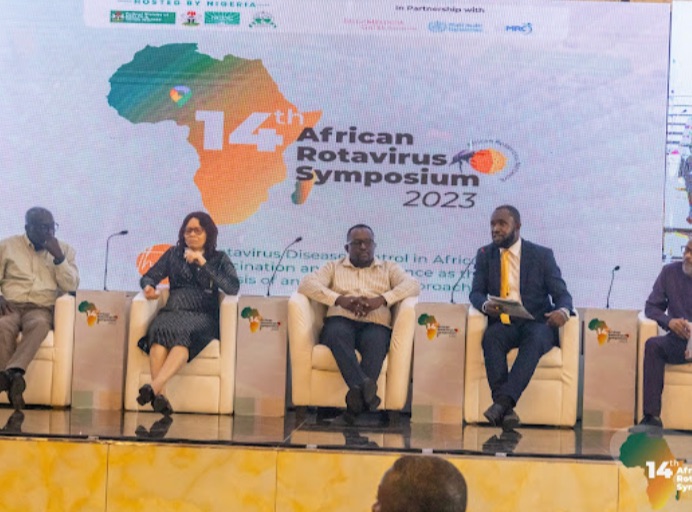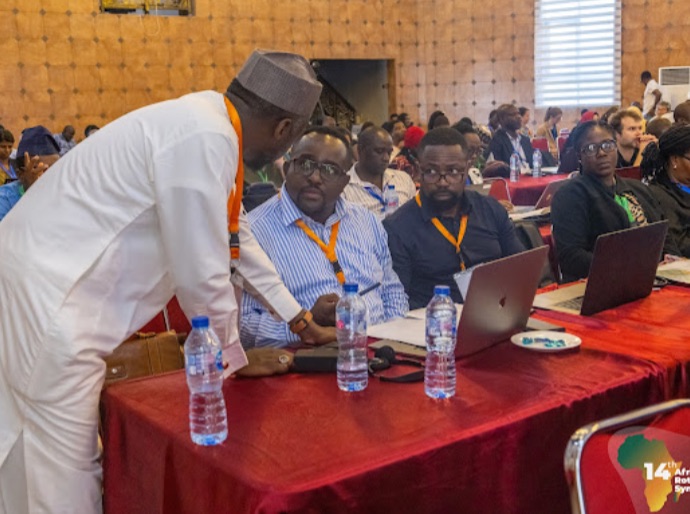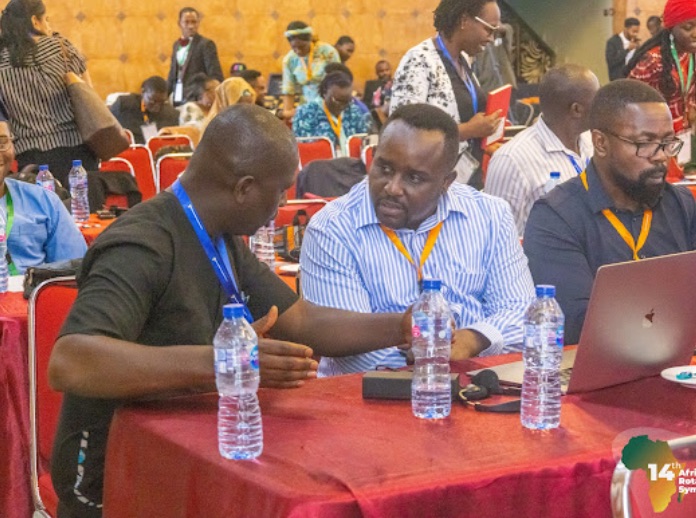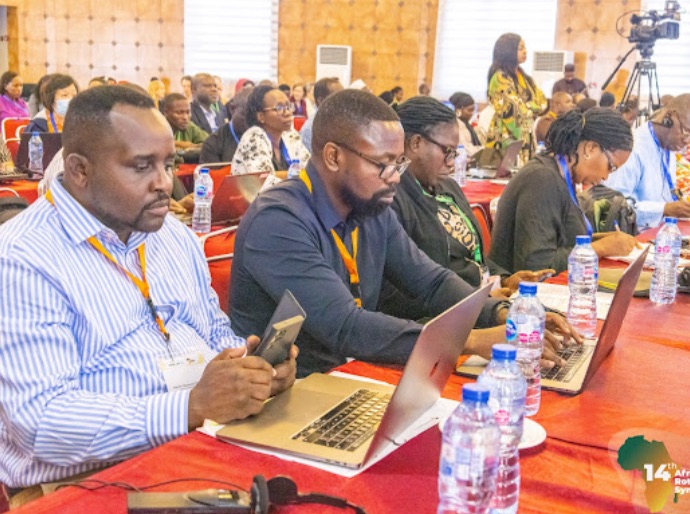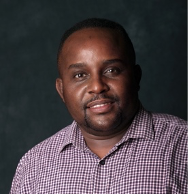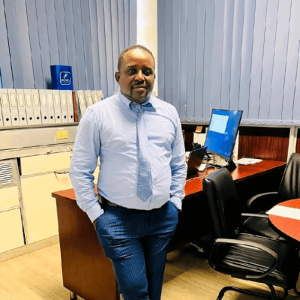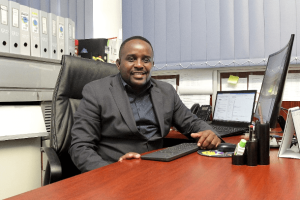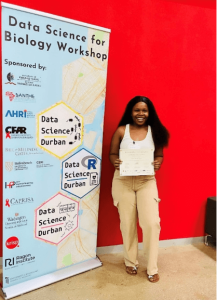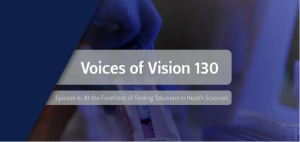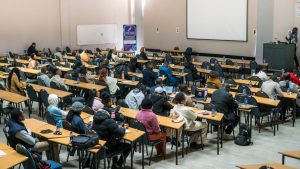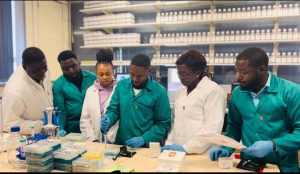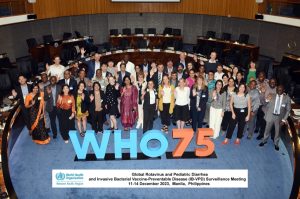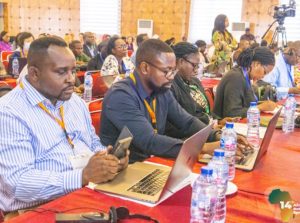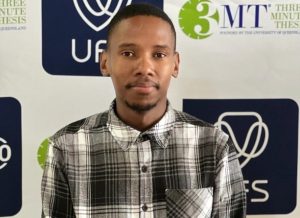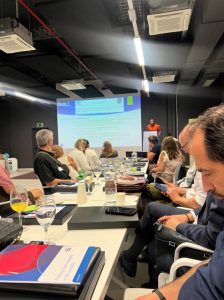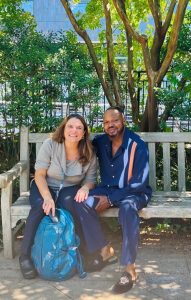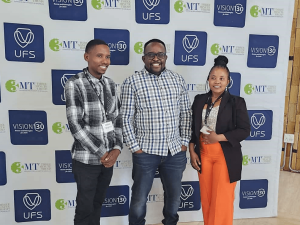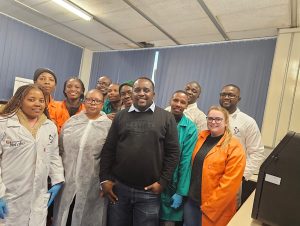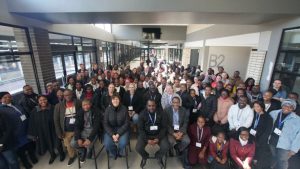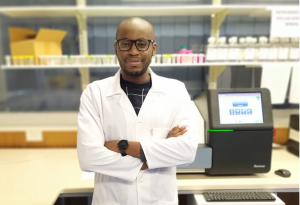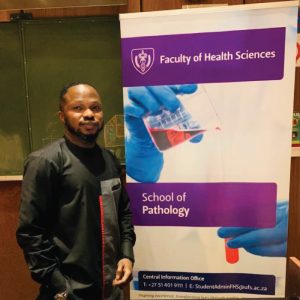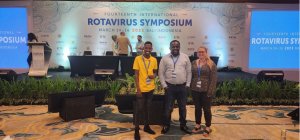A group of postgraduate students led by Prof. Martin Nyaga from the UFS-Next Generation
Sequencing Unit and Division of Virology in the Faculty of Health Sciences recently attended
the African Enteric Virus Genome Initiative-Sequencing and Antigenic Cartography of Enteric
Virus (AEVGI-SACEV) project meeting in Accra, and the 14 th African Rotavirus Symposium
in Abuja, Nigeria. An extension of the AEVGI-SACEV agenda in Kenya and Malawi was
therafter attended by Prof. Nyaga.
AEVGI-SACEV Project meeting
The AEVGI-SACEV is a consortium of African research scientists borne out of the African
Rotavirus Surveillance Network. Initially started as AEVGI (founded by Prof. Nyaga), its main
focus is understanding the effect of rotavirus vaccine introduction on rotavirus evolution on
the African continent, the consortium has now expanded to include other important enteric
viruses such sapovirus, astrovirus, adenovirus and norovirus, becoming AEVGI-SACEV. The
project aims to leverage a genomics and bioinformatics approach to understand the genetic
diversity of these gastroenteritis-associated pathogens in Africa. The AEVGI-SACEV held its
annual meeting in Accra, Ghana from the 02 to 07 of November 2023 to discuss on the
progress, milestones, future plans, and discuss future opportunities with the principal funder,
the Bill and Melinda Gates Foundation.
The 14 th African Rotavirus Symposium (Abuja, Nigeria)
Rotavirus is a highly contagious infection and the leading cause of acute diarrhoea among
children under five years worldwide, killing approximately 128,500 children every year across
the globe.
The African Rotavirus Symposium (ARS), supported by the African Rotavirus Network in
partnership with WHO Regional Office for Africa (WHO/AFRO) and the Bill & Melinda Gates
Foundation (BMGF), is one of the most significant rotavirus meetings, which enables
investigators from across Africa to disseminate their rotavirus research, create new contacts
and endorse new collaborations. The three-day conference gathered hundreds of attendees
including rotavirus researchers, policymakers, clinicians, public health practitioners, and
health officials to share ideas, expertise, and learning across organizations and countries in
the areas of the introduction of the rotavirus vaccine, the vaccine’s effectiveness, and the
prevention and control of diarrhoea disease in Africa.
Nigeria hosted the 14 th ARS in the capital city of Abuja form 08-10 November 2023 under the
theme “Disease control in Africa: Vaccination and Surveillance as the basis of an integrated
approach.” Three members of the UFS-NGS Unit participated at the 14 th African Rotavirus
Symposium.
“Prof. Duncan Steele Keynote Lecture: “Over Four Decades of Impact”
One of the key presentations of the symposium was the Prof. Duncan Steele Keynote
Lecture. Professor Steele is a South African Microbiologist with extensive experience in
Medical Virology and Microbiology, especially for diarrheal diseases. He is currently the
Deputy Director and strategic lead for enteric vaccines at the Bill and Mellinda Gates
Foundation in USA, responsible for a portfolio of vaccine research and development and implementation strategies for the control of diarrhoea and in vulnerable populations. Prof.
Steele was the Director of the South African Medical Research Council Diarrhoeal
Pathogens Research Unit at Medunsa, South Africa, where he developed a program of
research activities with local and international collaboration and funding that expanded into
other parts of Africa. He is one of the prominent rotavirus experts who has contributed
immensely towards rotavirus diarrhoeal diseases and prevention in Africa and globally. He
established a vaccine clinical trial in South Africa, which resulted in several large
international studies undertaking the clinical evaluation of rotavirus vaccines.
The Prof. Duncan Steele Keynote Lecture was delivered by Prof. Jeffrey Mphahlele, who is
currently the Deputy Vice-Chancellor for Research and Innovation at the North-West
University. He highlighted the efforts and contributions of Prof. Steele and the impact he has
made towards rotavirus research, particularly in alleviating rotavirus disease burden in the
continent. In his talk, Prof. Mphahlele made mention of the role that Prof. Steele played in
the development of next generation scientists through the training, supervising, and
mentoring in Medunsa. Among the few second-generation rotavirus scientists mentioned
was Prof. Martin Nyaga, who is an alumini of Medunsa. He is currently an Associate
Professor in the Division of Virology, and Director of the WHO Collaborating Center for
Vaccine Preventable Diseases surveillance and pathogen genomics at the UFS-NGS Unit,
Prof. Nyaga is leading the research in rotavirus vaccine effectiveness studies and other
enteric viruses, funded by the Bill and Melinda Gates Foundation and the World Health
Organization. As co-principal investigator in the AEVGI-SACEV consortium, Prof. Nyaga
presented on the on-going study on rotavirus genomic surveillance done in African countries
including South Africa, Ghana, Malawi and Kenya, at the 14 th ARS in Nigeria and also in the
Ghana, Kenya and Malawi AEVGI-SACEV meetings.
Other Presentations by UFS-NGS Unit’s academics
Miss Robyn Potgieter, an M.Med.Sc (Virology) student supervised by Prof. Martin Nyaga,
presented on the genome surveillance of rotavirus strains circulating in Rwanda before and
after the introduction of rotavirus vaccine in Rwanda. Potgieter firmly believes that although
the introduction of the rotavirus vaccines has substantially contributed to the reduction of
rotavirus morbidity and mortality worldwide, concerns persist about the re-emergence of
strains that might affect vaccine effectiveness in the long-term.
Miss Hlengiwe Sondlane, who only attended the AEVGI-SACEV meeting in Ghana, is an
M.MedSc (Virology) student affiliated with the UFS-NGS Unit, supervised by Prof. Martin
Nyaga. Sondlane’s research is on the genomics of human respiratory syncytial virus (RSV),
one of the medically important viruses causing respiratory infections in humans, and the
second most common cause of infant mortality, globally. Sondlane’s project aims to
characterize the circulating RSV strains in South African paediatric population, during the
COVID-19 era. According to Sondlane, there is a huge scarcity of whole genome
sequencing data of RSV in Africa, and the RSV vaccine was only licenced in December
2023, understanding the genomic characteristics and circulating patterns of this virus is
crucial in developing effective therapeutics that will benefit infants, who are the most
vulnerable group. In her project, she has managed to sequence the complete genomes of
RSV strains isolated from children with respiratory illnesses, in the Free State Province. As
part of the consortium, Sondlane presented on the phylogenetic dynamics and epidemiology
of RSV at the AEVGI-SACEV meeting in Accra, and according to her analysis, the RSV strains from her study showed similarities with those previously detected in Kenya, indicating
potential transmission of these strains within the continent.
Milton Mogotsi, a final year PhD scholar in Medical Virology in the Faculty of Health
Sciences, University of the Free State (UFS), under the supervision of Prof Martin Nyaga
attended the meetings in Ghana and Nigeria. His research project aims to understand the
evolution and the dynamics of virus populations in the gut of newborns, using advanced
techniques like metagenomic Next Generation Sequencing coupled with Bioinformatic
analysis. This is significant research, considering that viral intestinal infections are among
the leading causes of childhood deaths and hospitalizations. Mogotsi highlighted in his
research that resource-poor countries are the most affected when it comes to enteric
infectious diseases, with some of the contributing factors including sub-optimal sanitation,
limited access to safe drinking water, and the lack of proper hygiene. Mogotsi further stated
that infants and children are at a greater risk of infections as they have not yet developed
habits that minimize their exposure, such as washing hands, and often tend to suffer serious
complications due to their underdeveloped immune system. His study sought to discover
what viruses are present in babies’ gut, their source of origin, and understand how their
composition and diversity change with age, as well their long-term effect on the health of
infants. Mogotsi’s study, which is currently under review for publication in Gut Microbes
international peer-reviewed journal, was presented at the AEVGI-SACEV project meeting in
Accra, Ghana the 14 th African Rotavirus Symposium in Abuja, Nigeria. His study revealed
that the gut of newborns is colonized by viruses within the first week of life and increases in
richness and diversity with age. It was further discovered that a large fraction of these
viruses included those commonly associated with diarrhoea in children, including rotavirus.
“I believe that research is fundamental to advances in human society, it allows you to
pursue your interests, get curious and immerse yourself in discovering everything there is to
know. It challenges you in new ways while sharpening your problem-solving skills” stated
Mogotsi.
Closing remarks
“This was a great opportunity for the UFS-NGS Unit’s postgraduate students to share their
research findings and network with global peers. As emerging researchers, following the
latest advancements in research and holding discussions with fellow scientists will benefit
them in expanding their knowledge in the field. I am very proud of my students on the work
they are doing, and I hope attending these conferences will help them improve their future
scientific approaches and more importantly develop research ideas and initiating
collaborations.” Says Prof. Nyaga.
